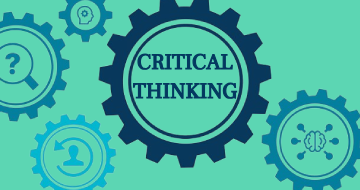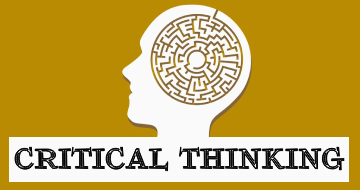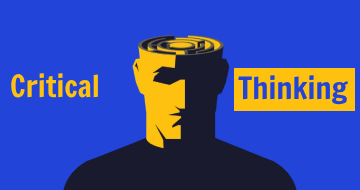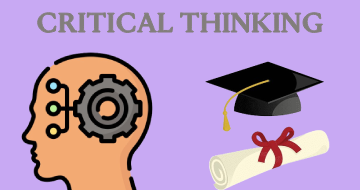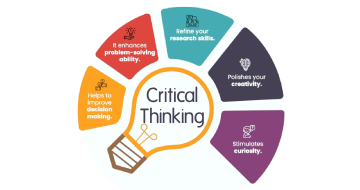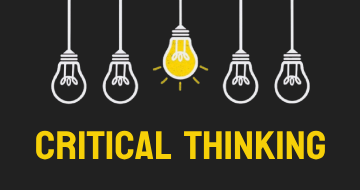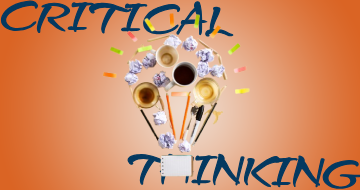IIRF Online > Personal Development > Memory & Study Skills > Critical Thinking > Critical Thinker Academy: Learn to Think Like a Philosopher
Critical Thinker Academy: Learn to Think Like a Philosopher by Udemy
How to improve your grades, advance in your job and expand your mind -- by learning how to think for yourself!
Course Highlights
- fundamental concepts of critical thinking (logic, argument analysis, rhetoric, reasoning with probabilities, the importance of background knowledge, etc.)
- the importance of critical thinking for personal development, participation in democratic society, and the pursuit of wisdom
- the role that critical thinking principles play in good essay writing
- how cognitive biases make us prone to errors in how we form beliefs and make judgments
- how our tribal psychology and political polarization affect our ability to think critically
- how debates in science often turn on the meanings of key terms, like "theory", "fact", "hypothesis" and "law"
- and much more!
Skills you will learn!
Curriculum
2 Topics
What People Are Saying ...
How to Use The Course Materials
5 Topics
Why Critical Thinking is Important - PDF Ebook
Logical Self-Defense
Personal Empowerment
Liberal Democracy and Civic Duty
Philosophy and the Search for Wisdom
6 Topics
The Five Pillars of Critical Thinking - PDF Ebook
The Five Pillars of Critical Thinking
Logic for Critical Thinkers
Argumentation versus Rhetoric
Critical Thinking's Dirty Secret
What Critical Thinkers Can Learn From Good Actors
4 Topics
Cognitive Biases and Critical Thinking - PDF Ebook
Cognitive Biases: Introduction
Cognitive Biases and the Authority of Science
Cognitive Biases and the Evolution of Reason
6 Topics
Introduction
Belief Identity and Resistance: Introduction to the Core Belief Model
What is Tribalism? Why is it Dangerous?
Our Tribal Intelligence: Personal vs Group Knowledge
In Our Tribe We Trust: How Group Identities Shape Our Thinking
Appendix to "Our Tribal Intelligence": The Knowledge Illusion
3 Topics
Value Pluralism: We Care About Many Kinds of Values
Tribalism and the Focusing Illusion
Polarization and Politics: How it Impairs Our Critical Thinking Faculties
42 Topics
Introduction
Is Evolution a Theory a Fact or Both?
Overview
An Important Distinction: Epistemically Loaded versus Neutral Language
"Theory" as Down-Player
"Theory" as Up-Player
Why We Need an Epistemically Neutral Concept of "Theory"
A Neutral Definition of "Theory": A Classical (but incomplete) Story
A Neutral Definition of "Theory": A More Sophisticated Story
"You Can't Deny the Facts": An Epistemically Loaded Definition of "Fact"
"I Had the Facts Wrong": An Epistemically Neutral Definition of "Fact"
Can There Be Theoretical Facts?
Epistemically Loaded Definitions of "Law"
Examples of Laws in Biology and Psychology
Examples of Laws in Astronomy and Physics
Unpacking the Neutral Concept of "Law"
But Are There Any Laws?
A Quick Word: Are Laws Explanatory?
"That's Just a Hypothesis": An Epistemically Loaded Definition of "Hypothesis"
An Epistemically Neutral Definition of "Hypothesis"
Introduction: What is a Model?
Maps and Models
Models as Tools For Reasoning About the World
How Equations Can Be Models
Is There a Difference Between a Model and a Theory?
Introduction: Theories Models Truth and Reality
The Challenge of Interpreting Scientific Theories
Prediction and Truth: Lessons from Ptolemy
Prediction and Truth: Lessons From the Kinetic Theory of Gases
Assignment: Critique a 7 Minute Video on the Vocabulary of Science
Here's the Video: "Fact vs. Theory vs. Hypothesis vs. Law ... EXPLAINED!"
1. The Motivation For the Video
2. "Scales of Truthiness"
3. The Fundamental Error
4. The Problem With Defining Facts in Terms of Observations
5. Problems With Defining Hypotheses as Starting Points For Inquiry
6. Problems With Defining Theories as Well-Supported
7. Problems With Defining Evolution as an Observable Fact
8. Problems With Defining Laws in Terms of Observations
9. Can Laws Explain or Do They Just Describe? Kepler Newton and Einstein
10. Analyzing the Last Slide
11. Who is to Blame?
8 Topics
Critical Thinking About Conspiracies - PDF Ebook
Critical Thinking About Conspiracies (I): Introduction
Critical Thinking About Conspiracies (II): The Argument for Default Skepticism
Critical Thinking About Conspiracies (III): Mind Control and Falsifiability
Causation God and the Big Bang - PDF Ebook
Causation God and the Big Bang
Five Reasons to Major in Philosophy - PDF Ebook
Five Reasons to Major in Philosophy
25 Topics
Basic Concepts in Logic and Argumentation - PDF Ebook
What is an Argument?
What is an Argument?
What is a Claim or Statement?
What is a Claim or Statement?
What is a Good Argument? (I)
What is a Good Argument? (I)
Identifying Premises and Conclusions
Identifying Premises and Conclusions
The Truth Condition
The Truth Condition
The Logic Condition
The Logic Condition
Valid vs Invalid Arguments
Valid vs Invalid Arguments
Strong vs Weak Arguments
Strong vs Weak Arguments
What is a Good Argument? (II)
What is a Good Argument? (II)
Deductive Arguments and Valid Reasoning
Deductive Arguments and Valid Reasoning
Inductive Arguments and Invalid Reasoning
Inductive Arguments and Invalid Reasoning
Induction and Scientific Reasoning
Induction and Scientific Reasoning
30 Topics
Basic Concepts in Propositional Logic - PDF Ebook
Introduction
Conjunctions (A and B)
Disjunctions (A or B)
Conditionals (If A then B)
Compound Claims
Contradictories (not-A)
Contradictories vs Contraries
Contradictions (A and not-A)
Consistent vs Inconsistent Sets of Claims
Contradictories Contraries and Consistency
not-(not-A)
not-(A and B)
not-(A or B)
not-(If A then B)
Contradictories of Compound Claims
A if B
A only if B
A if and only if B
A unless B
The Contrapositive: If not-B then not-A
(not-A) or B
Necessary and Sufficient
Ways to Say IF A THEN B
Categorical vs Propositional Logic
All A are B
Some A are B
Only A are B
The Square of Opposition
All Some and Only - Categorical Claims
14 Topics
Formal Fallacies: Common Valid and Invalid Argument Forms - PDF Ebook
Valid Forms Using OR
Invalid Forms Using OR
Valid and Invalid Argument Forms Using OR
Modus Ponens
Modus Tollens
Modus Ponens and Modus Tollens
Hypothetical Syllogism
Affirming the Consequent
Denying the Antecedent
Valid and Invalid Argument Forms Using IF A THEN B
Valid and Invalid Forms Using ALL
Valid and Invalid Forms Using SOME
Valid and Invalid Argument Forms Using ALL and SOME
18 Topics
Informal Fallacies: A Guided Tour - PDF Ebook
What is a Fallacy?
Categorizing Fallacies: Pros and Cons
The Rules of Rational Argumentation
What is a fallacy?
Ad Hominem (Abusive)
Ad Hominem (Guilt by Association)
Appeal to Hypocrisy (tu quoque)
Appeal to Popular Belief (or Practice)
Appeal to Authority
False Dilemma
Slippery Slope
Straw Man
Red Herring
Begging the Question (Narrow Sense)
Begging the Question (Broad Sense)
Types of Fallacies
Identify the Fallacy
9 Topics
What is Probability? - PDF Ebook
Probability: Why Learn This Stuff?
What is Inductive Logic?
Probability as a Mathematical Object vs What That Object Represents
Classical Probability
Logical Probability
Frequency Interpretations
Subjective (Bayesian) Probability
Propensity Interpretations
19 Topics
The Rules for Reasoning with Probabilities - PDF Ebook
What Has a Probability? Propositions vs Events
Probabilities Range Between 0 and 1
Mutually Exclusive Events
Independent Events
The Negation Rule: P(not-A)
Restricted Disjunction Rule: P(A or B) = P(A) + P(B)
Restricted Disjunction Rule
General Disjunction Rule: P(A or B) = P(A) + P(B) - P(A and B)
General Disjunction Rule
Restricted Conjunction Rule: P(A and B) = P(A) x P(B)
Restricted Conjunction Rule
General Conjunction Rule: P(A and B) = P(A) x P(B|A)
General Conjunction Rule
General Conditional Probability Rule
Total Probability Rule
Bayes' Rule
Bayes' Rule
Answers to Probability Theory Quiz Questions
1 Topic
Introduction: Work in Progress ...
5 Topics
Critical Thinking About Coincidences: Introduction
The Basic Fallacy
Borel's Law: Understanding Impossible Events
How to Create the Illusion of Miraculous Predictive Power
The Birthday Problem Lottery Coincidences and the Power of Very Large Numbers
7 Topics
Introduction
The Basic Fallacy
Fairness Bias and Independence
How Can You Tell Whether a Chance Setup is Unfair?
The Physics of Coin Tosses
Casino Games: Why the House Always Wins
Cognitive Factors and the Psychology of Gambling
1 Topic
The Small Sample Fallacy: Looking for Causes of Statistical Artifacts
14 Topics
How to Write a Good Argumentative Essay - PDF Ebook
Introduction
A Minimal Five-Part Structure
Writing the Introduction
Writing the Conclusion
The Essay: Should Teachers Be Allowed to Ban Laptops in Classrooms?
Analysis: The Introduction
Analysis: Main Body: First Argument
Analysis: Main Body: Second Argument
Analysis: Main Body: Third Argument
Analysis: Main Body: Evaluation and Recommendations
Analysis: The Conclusion
The Essay: Improved Version
The Essay: Improved Version with Commentary
16 Topics
How to Cite Sources and Avoid Plagiarism - PDF Ebook
Introduction
Plagiarism: The Basic Definition
Downloading or Buying Whole Papers
Cutting and Pasting From Several Sources
Changing Some Words But Copying Whole Phrases
Paraphrasing Without Attribution
The Debate Over Patchwriting
When Should I Cite a Source?
What Needs to be Cited?
How to Cite: Mark the Boundaries
Citing Exact Words
Citing a Longer Quotation
Citing a Source But Not Quoting
A Comment About Common Knowledge
Citation Styles: MLA APA CSE Chicago Turabian
1 Topic
Bonus Lecture: Other Courses I Teach Podcasts I Produce etc.

Critical Thinker Academy: Learn to Think Like a Philosopher
